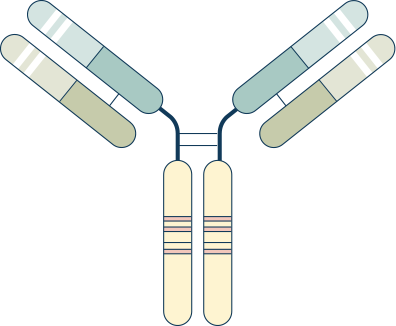Committed to developing better treatments for patients with immune-mediated diseases
Pipeline
Our pipeline is focused on immune-mediated diseases, including advancing budoprutug, an anti-CD19 antibody designed for a broad range of B-cell mediated diseases and CLYM116, an anti-APRIL antibody in IND-enabling studies for IgAN.
CANDIDATE
Budoprutug IV
Anti-CD19
Indications
Primary Membranous Nephropathy
Phase 2
Immune Thrombocytopenia
Phase 1
Systemic Lupus Erythematosus
Phase 1
CANDIDATE
Budoprutug SC
Anti-CD19
Indications
Autoimmune Disease
Phase 1
CANDIDATE
CLYM116*
Anti-APRIL
Indications
IgA Nephropathy
Pre-Clinical
More than 2.5 million Americans suffer from a B-cell mediated disease
Budoprutug, an anti-CD19 mAb
Budoprutug, an anti-CD19 mAb, is designed to deplete CD19-positive B cells, including antibody-secreting cells, in order to directly reduce pathogenic autoantibodies.
This reduction of autoantibodies has the potential to be disease-modifying in immune-mediated diseases, such as:
- Membranous Nephropathy (MN)
- Systemic Lupus Erythematosus (SLE)
- Immune Thrombocytopenia (ITP)
Potential for best-in-class efficacy
Rapid, deep, and durable B-cell depletion at doses as low as 100 mg
Opportunity for patient-tailored approach
to treatment
Potential to provide IV and/or subcutaneous offerings where favorable to patient and point-of-care
Optimized dosing and tolerability
Potential for induction and maintenance dosing paradigm with favorable safety, tolerability profile
Pipeline-in-a-molecule potential
3 distinct opportunity sets: IgG4-Mediated, Complex Systemic, & Validated Rare

CLYM116
Anti-APRIL Fc+, mAb
CLYM116, an anti-APRIL (A PRoliferation Inducing Ligand) mAb, utilizes a novel mechanism of action to prevent APRIL signaling, which has the potential to demonstrate more rapid, deep and durable inhibition of APRIL signaling.
This rapid, deep and durable inhibition of APRIL signaling in patients has the potential to be disease modifying in:
- IgA Nephropathy (IgAN)
- Other B-cell mediated diseases
Potential for best-in-class efficacy
Novel mechanism has potential to enable more rapid, deep and durable inhibition of APRIL signaling
Potential for best-in-class tolerability
Avoids potential immunosuppression associated with BAFF inhibition; Fc engineered to silence effector function
Optimized dosing
Subcutaneous administration with potential for less frequent dosing, reducing patient burden
Early insights
Primary Membranous Nephropathy (MN)*
Primary Membranous Nephropathy is caused by autoantibody-mediated destruction of podocytes at the glomerular basement membrane or GBM in the kidney. Clinically, MN typically presents with nephrotic syndrome, characterized by significant proteinuria, hypoalbuminemia, and edema. Patients may also experience hypertension and renal insufficiency. The management of MN is primarily focused on achieving complete remission of proteinuria as this has been definitively correlated to improved outcomes in patients.
The source of autoantibodies in MN is CD19+ plasmablasts and plasma cells, and depleting these B-cells with budoprutug has the potential to benefit this patient population. In a Phase 1b clinical trial of budoprutug in Membranous Nephropathy (MN), of the 5 patients who completed all 4 doses of study drug, 3 out of 5 (or 60%) of patients achieved a complete remission of proteinuria, with the remaining two achieving partial remission (>50% reduction in UPCR <3.5 g/g). Additionally, complete b-cell depletion was achieved in all 5 patients.
*Climb Bio has received orphan drug designation (ODD) for MN which offers several incentives to offset the challenges associated with developing treatments for rare diseases, such as longer market exclusivity, opportunities for scientific advice and feedback and access to expedited regulatory pathways
Systemic Lupus Erythematosus (SLE)
SLE comprises a group of relapsing/remitting and chronic disorders characterized by persistence of pathologic subsets of immune cells, inflammatory mediators, and autoantibodies that directly interfere with critical functions, including clotting and neuronal signaling, that target cells for destruction through phagocytosis, cause cell- or complement-cytotoxicity, and damage tissues through immune complex deposits. Clinically, symptoms and severity vary widely, from fatigue, rash and intermittent arthralgias to life-threatening vasculitis and organ system failure.
Nephritis is the most common organ system threat; fatigue and cognitive dysfunction are the most common disabling manifestation. The underlying pathology involves production of autoantibodies by autoreactive B cells that contribute to inflammation and tissue damage. Because budoprutug is designed to target and deplete CD19-expressing B cells known to produce autoantibodies it has the potential to be a promising treatment option for patients with SLE.
Immune Thrombocytopenia (ITP)
ITP is a predominantly IgG1 immune mediated disorder characterized by a low platelet count, bruising, and hemorrhagic episodes caused by antiplatelet autoantibodies. These autoantibodies lead to accelerated removal of platelets and when bone marrow compensation is not adequate, platelet levels fall and this can result in petechiae and purpura, extensive bleeding, and chronic fatigue. The management of ITP is varied and based on disease severity with CD20 B cell depleters effective in treating a portion of patients.
We believe that budoprutug, which targets plasma cells, the autoantibody producing cells implicated in ITP, has the potential to be a treatment option for patients.
IgA Nephropathy (IgAN)
IgA Nephropathy (IgAN), also known as Berger’s Disease is an autoantibody mediated disease caused by deposition of immune complexes, comprising IgA and IgG, in the glomeruli. Clinically, IgAN symptoms include blood in the urine, protein in the urine, high blood pressure, and edema. IgAN progresses over time, with the excess immune complexes causing inflammation and scarring, which impairs how waste is filtered in the kidneys and can lead to chronic kidney disease or kidney failure.
Through its anti-APRIL mechanism of action, CLYM116 has the potential to deplete IgA and be a disease modifying treatment for IgAN.